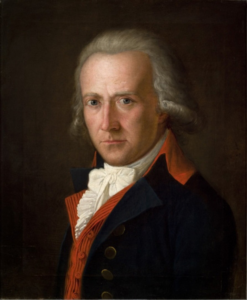Echo
(Poet's title: Widerhall)
Set by Schubert:
D 428
for TTB trio[May 1816]
Auf ewig dein, wenn Berg und Meere trennen,
Wenn Stürme dräun,
Wenn Weste saüseln oder Wüsten brennen:
Auf ewig dein.
Beim Kerzenglanz im stolzen Marmorsaale,
Beim Silberschein
Des Abendmonds im stillen Hirtentale:
Auf ewig dein.
Senkt einst mein Genius die Fackel nieder,
Mich zu befrein,
Dann hallt’s noch im gebrochnen Herzen wider:
Auf ewig dein.
For ever yours! When mountains and oceans split up,
When storms threaten.
When westerly winds blow or deserts burn:
For ever yours!
In candle light in proud marble halls,
In the silver glow
Of the evening moon in the quiet pastoral valley:
For ever yours!
When the time comes for my guiding spirit to lower the torch
To set me free,
Then it will still echo in the broken heart:
For ever yours!
All translations into English that appear on this website, unless otherwise stated, are by Malcolm Wren. You are free to use them on condition that you acknowledge Malcolm Wren as the translator and schubertsong.uk as the source. Unless otherwise stated, the comments and essays that appear after the texts and translations are by Malcolm Wren and are © Copyright.
☙
Themes and images in this text:
Candles Deserts East and West Echo Eternity Hearts Marble Mountains and cliffs Night and the moon The sea Shepherds Silver Storms Torches Valleys Wind
‘For ever’ is a long time, and ‘for ever yours’ is a big claim. To support it, the author invokes a full range of eventualities, from continental drift to global warming. In all the extremes of nature and in the height of human culture (‘marble halls’), illuminated by different kinds of light (candles or moonshine), nothing changes, I am still yours. Stanza 1 might be about a hypothetical future (‘wenn’ can mean ‘if’ as well as ‘when’ or ‘whenever’); stanza 2 is about different places. Time and space will eventually end, as will my own life when my torch is extinguished. Even then the echo will be audible: yours for eternity.
☙
Original Spelling Wiederhall Auf ewig dein! Wenn Berg' und Meere trennen, Wenn Stürme dräun, Wenn Weste saüseln oder Wüsten brennen: Auf ewig dein! Beim Kerzenglanz im stolzen Marmorsaale, Beim Silberschein Des Abendmonds im stillen Hirtenthale: Auf ewig dein! Senkt einst mein Genius die Fackel nieder, Mich zu befrein, Dann hallts noch im gebrochnen Herzen wieder: Auf ewig dein!
Confirmed by Peter Rastl with Gedichte von Friedrich von Matthisson. Erster Theil. Tübingen, bei Cotta, 1811, page 265; with Morgenblatt für gebildete Stände. Vierter Jahrgang. 1810. Im Verlag der J. G. Cotta’schen Buchhandlung in Tübingen. Nro. 260. Diensttag, 30. Oktober, 1810, page 1037; and with Schriften von Friedrich von Matthisson, Vierter Band, Ausgabe letzter Hand, Zurich: Orell, Fuessli, und Co., 1825, page 181.
To see an early edition of the text, go to page 265 [287 von 380] here: http://digital.onb.ac.at/OnbViewer/viewer.faces?doc=ABO_%2BZ185186703


